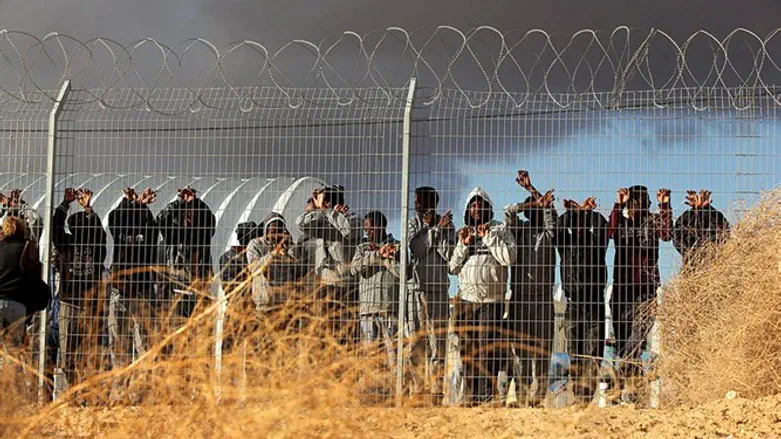
The Immigration and Border Authority, under the auspices of the Interior Ministry, will soon announce that illegal infiltrators from Sudan and Eritrea will have 90 days to leave Israel or face jail, Haaretz reported.
The order will not apply at first to children, parents of small children who depend on them for support, the elderly, victims of human trafficking, and those suffering from severe health issues. Illegal infiltrators who have applied for refugee status will also be exempt at first if they have not yet received a response to their request.
The move comes after the Knesset passed a law closing the Holot detention facility, where thousands of infiltrators have been detained since a surge in illegal immigration less than a decade ago. The facility will be closed over a period of several months.
Tens of thousands of illegal immigrants crossed into Israel over the past decade via the southern border with Egypt. Most of the infiltrators came from Eritrea, Sudan, Somalia, and other countries in northeastern Africa.
Following the construction of the border fence along the Israeli-Egyptian frontier, illegal border crossings plummeted by more than 99% - but only after nearly 60,000 illegal immigrants entered Israel prior to the construction of the fence in 2012.
In 2014, the Netanyahu government implemented a “carrot and stick” policy to reduce Israel’s illegal immigrant population, then estimated at around 55,000. Under the plan, the government offered cash payments of $3,500 to illegal immigrants who voluntarily left the country either for their countries of origin or for ‘third-party’ states which had cut deals with Israel to accept illegal immigrants in exchange for monetary compensation. Those infiltrators who refused the offer were detained at the Holot and Saharonim detention centers.
Some 15,000 infiltrators self-deported since 2014, though some 40,000 – not including children born to illegal immigrants in Israel – remain in the country.
But in August of 2017, the Supreme Court blocked attempts by the government to deport those who refused to voluntarily leave the country, and ruled that detainees could be held at the Holot facility for no more than 12 months – essentially guaranteeing that illegal immigrants would be allowed to remain in Israel indefinitely.
In the wake of the court’s decision, Prime Minister Netanyahu negotiated new agreements with third-party states, which agreed to receive not only those illegal immigrants who volunteer to leave, but also deportees.
The law passed the Knesset will enable the government to deport recalcitrant illegal immigrants who have in the past refused to self-deport in exchange for $3,500 in cash, after the Supreme Court first ruled against forced deportations on the grounds that only voluntarily deportations had been covered in Israel’s initial agreements with third-party states.